The UNIC website uses cookies to improve your experience. Read our full Cookie Policy here.
In spring and summer 2021, each UNIC partner university launched a series of UNIC CityLabs with students, staff, local communities, and stakeholders. UNIC CityLabs can take many interactive forms: workshops, panel discussions, or seminars. Regardless of the form, the goal is always the same: to engage participants to help identify and discuss local or regional challenges and to drive local change by supporting the implementation of created solutions.
Different cities, common challenges
Post-industrial cities are united by a fierce urban solidarity – especially in times of failing industries and dwindling public funds. In times of structural societal and economical changes, universities can act as a motor for the regional development and prosperity. Universities are not only educating the new workforce but are renewing the existing landscape of businesses in post-industrial cities.
The UNIC Alliance unites not only eight universities, but also their eight post-industrial cities: Bilbao, Bochum, Cork, Istanbul, Liege, Oulu, Rotterdam, and Zagreb. These cities are considered key stakeholders and the relationships between our universities and cities are based on reciprocal, empowering trust. With our UNIC CityLabs, we are creating a model for university-city collaboration. The results of the UNIC CityLabs are not only relevant for the individual cities and the universities where they take place, but can also be shared collectively with fellow post-industrial cities that are facing similar challenges.
In the fall of 2021, UNIC will debut its Open Case Repository. The UNIC Open Case Repository will act as an archive of case-based knowledge and findings from the UNIC CityLabs. This repository will build the foundation for an innovative solution infrastructure with a rich empirical data basis. Below, the results of the first UNIC CityLabs highlight two common themes (Ageing well and Diversity & Inclusion) that contribute to urban resilience in our post-industrial cities and provide a sample of the types of cases that will be included in the repository.
Ageing well in post-industrial cities
Oulu
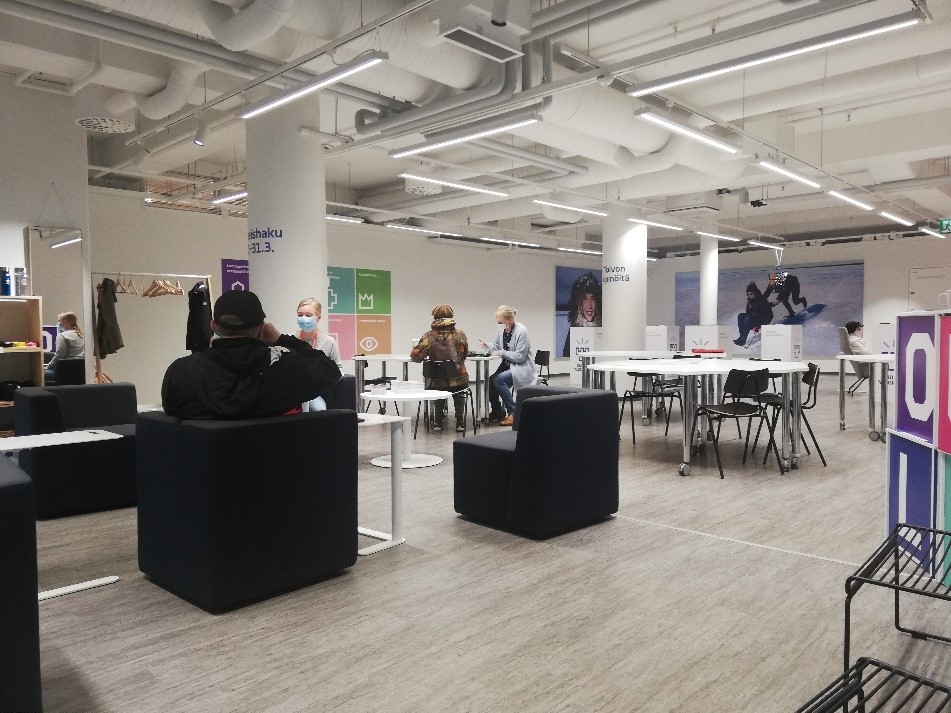
On the 24th of May, researchers from the University of Oulu GeroNursing Centre spent the day interviewing citizens of Oulu about their experiences, hopes, and worries about aging in Oulu. The university of Oulu pop-up space in the city centre was a perfect location for meeting passers-by. Common themes that interviewees brought up were meaningful free-time, accessible public transport, and the digitalization of services.
Liège
On the 28th of June, the University of Liège organised its first local CityLab on “Ageing well in post-industrial cities” gathering 30 participants from students to seniors, from academia to non-profit organizations and from citizens to public actors.
Three thematic groups on the “housing for elderly”, “anticipating ageing well” and the “perception of elderly”, composed of multigenerational groups from different fields have tried to understand what it means to “age well” in a city with a rich industrial past: how do the stories of each individual link together and react to today's realities? How does the city, and in particular Liège, position itself with regard to "ageing well"?
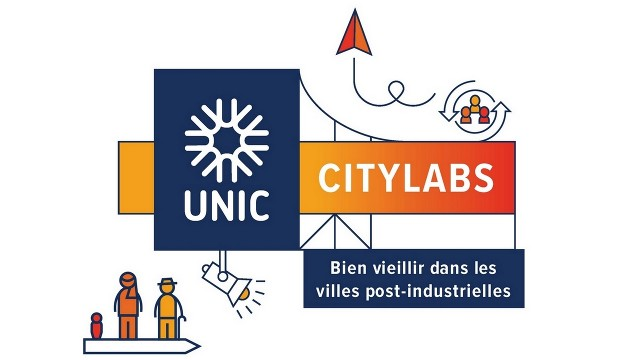
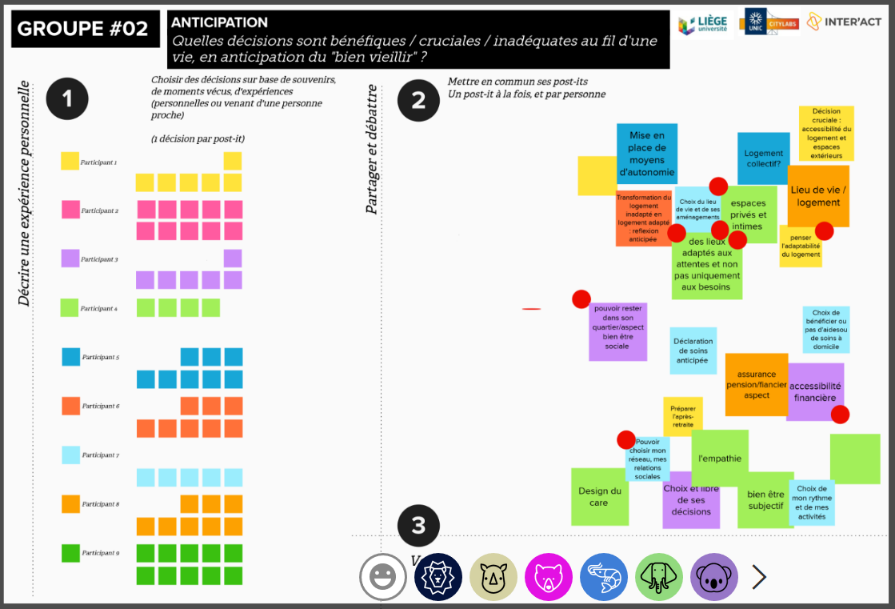
Page Break
UDeusto:
On the 15th of June, the University of Deusto hosted its first Pop-Up CityLab on the topic of Ageing Well in Post-Industrial Cities, with two sessions: one focused on Ageing Well and the other on the Silver Economy.
The event, held online, gathered more than 60 people, including citizens, students, academia and city stakeholders, who discussed about their different perspectives on important challenges of ageing.
This discussion took place in Spanish and will be followed by a joint UNIC virtual meeting with University of Liège and University of Oulu, among others.
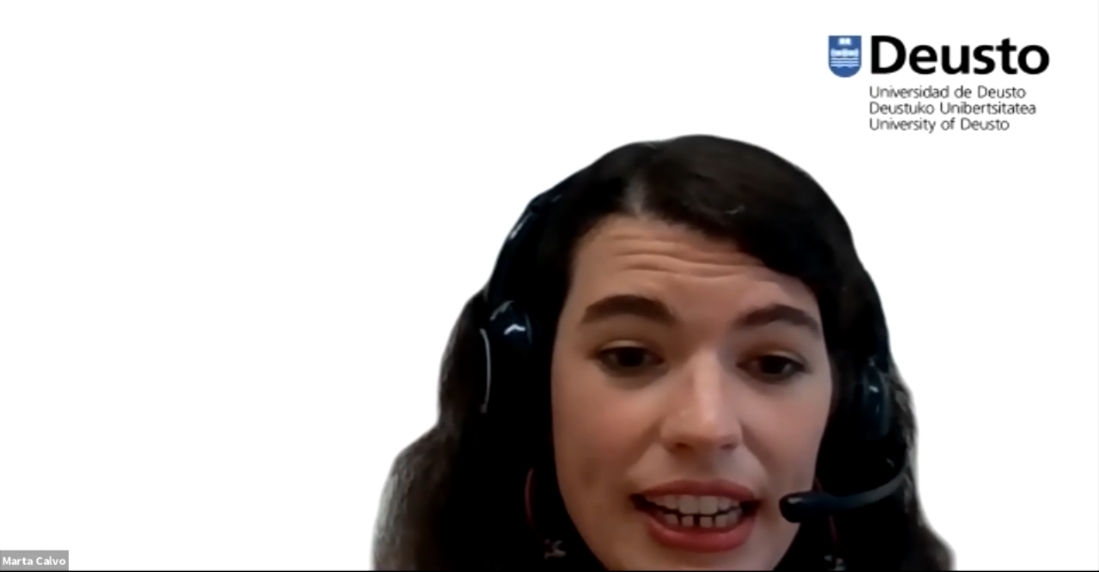
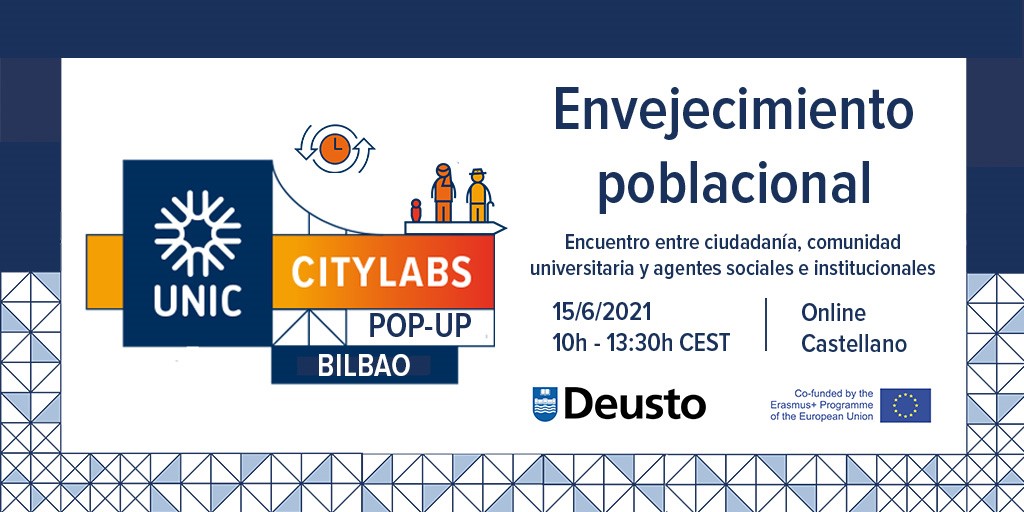
Bochum: Ageing Well
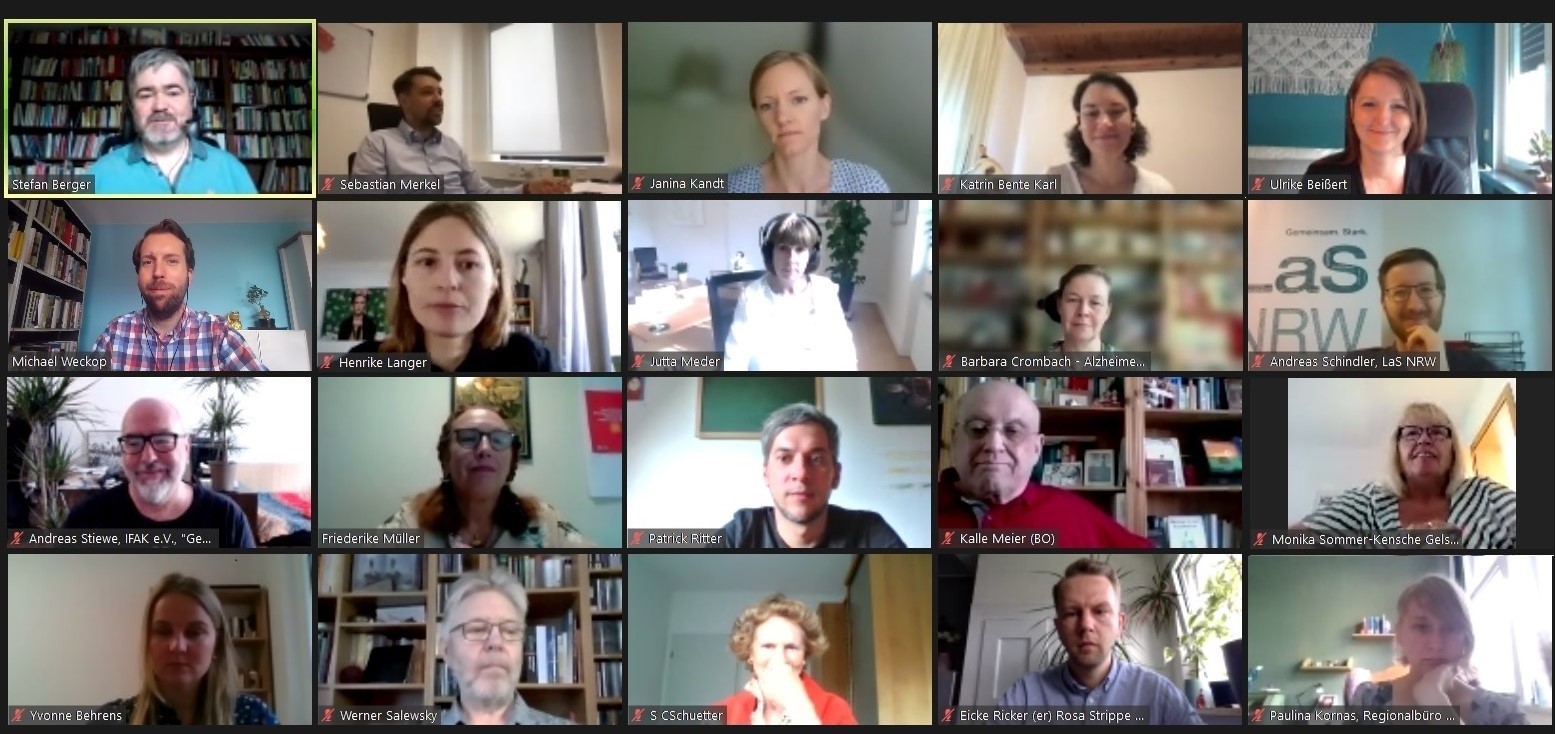
On the 8th of July, the Ruhr-Universität Bochum organised its second local CityLab on “Aging well and the importance of memory” gathering 22 participants including central Bochum actors, scientists and the city administration.
Three main topics were discussed: Imagining the good life and memories, Good ageing and diversity of lifestyles, and post-industrial society and technology.
An article in German:
Diversity & Inclusion
Bochum: Educational Equality
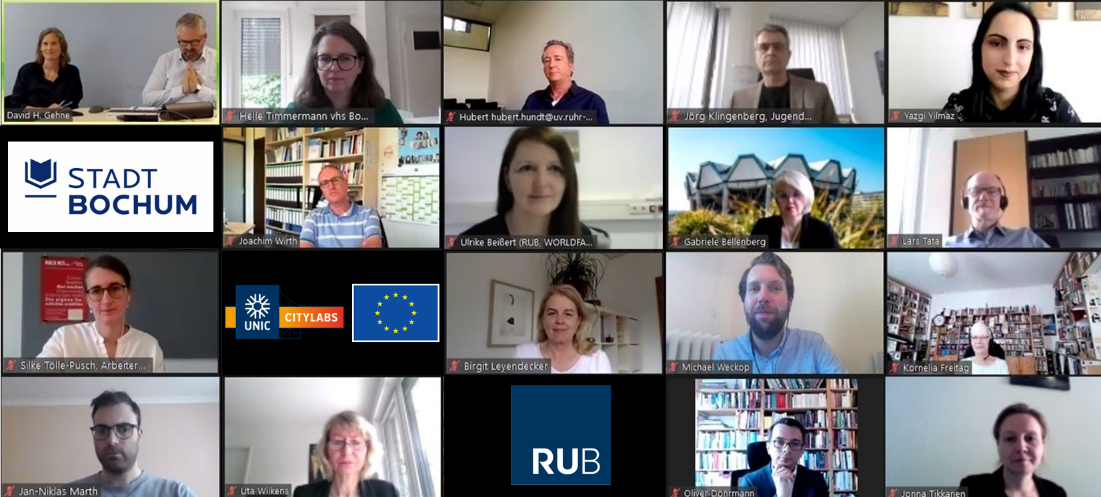
On May 18th, around 100 participants, including central Bochum actors, scientists, citizens, students and the city administration, used the virtual Pop-up CityLab to network with each other on the topic of educational equity and to exchange their experiences and knowledge.
Following an introductory round of keynote speeches, the participants were then able to discuss the challenges and levers in greater depth in five thematic workshops based on the stages of the educational vita (early childhood education, school education, vocational education, academic education and lifelong learning).
The picture shows (almost) all participants who actively contributed to the Pop-up CityLab: Impulse givers, expert workshop moderators and the organizers of the event.
KU
On June 25th, Koc University (KU) held its first pop up CityLab workshop entitled, “Diversity and inclusion: Inclusion of migrants and refugees in city life” which involved the participation of 23 students, 25 stakeholders from Istanbul Metropolitan Municipality, local non-governmental organizations (NGOs) as well as various migration scholars and academics. Organized virtually due to the pandemic, KU students from different disciplines participated in the CityLab to working on identifying and discussing different aspects of the challenge to the inclusion of refugees and migrants. Students engaged with diverse stakeholders including municipal actors, NGOs working on migration or inclusion related issues as well as migration scholars. In the weeks leading up to the workshop, students, assigned to thematic groups, conducted desk research and undertook interviews with stakeholders to identify root causes hindering the inclusion of migrants and refugees. Municipal actors, NGO actors and academics were invited to participate in the workshop. Using a problem tree, students presented their initial findings and then with the help of expert moderators, they developed these points further. The workshop provided a space for the different participants to engage and discuss the issues raised.
Event poster
Miro problem tree
Oulu:
Speakers preparing to discuss in a live streamed panel about their experiences of racism and discrimination in Oulu from the point of view of research, public decision making and an NGO. The speakers found that language and identity are strong factors of discrimination while methods of integration can actually segregate populations decreasing inclusion. How can we lower language requirements so that new members of our society have the opportunity to earn a living and integrate at the same time? The panel discussion can be seen in its entirety on the University of Oulu YouTube page.
EUR
On the 22nd of April, Erasmus University Rotterdam together with city officer Marcel de La Haye hosted the first Pop-up CityLab focused on exclusion and racism in Rotterdam. It was a coproduction and knowledge exchange on how to ‘translate’ issues of exclusion and racism in Rotterdam. Topics such as low trust in city government and low election turn out were highlighted.
On the 22nd of June, during the second Pop-Up CityLab hosted by Erasmus University Rotterdam, participantws zoomed in on issues of (dis)trust, exclusion and voting with a group of women in the Rotterdam neighborhood of Hillesluis. It was very insightful to hear about how they experience this neighborhood from a ‘migrant’ mother’s perspective.
These insightful meetings enable us to dedicate more research to the raised issues and think about possible interventions in co-creation with students. During the CityLab Festival in Liege, we will share our experiences and insights in more detail.
Urban Resilience
UCC
Shaping the Future of Marine and Maritime Communities
On 1st June a virtual workshop “Shaping the Future of Marine and Maritime Communities” was organised in Cork. Local representatives from government, industry / business, academia, and civil society and citizens (i.e. the Quadruple Helix) came together to jointly help identify challenges that are faced by marine and maritime communities and to co-examine the potential for new relevant research activities. The premise of this quadruple helix stakeholder approach is that diversity of agents, sectors, and organisations, and at multiple levels, co-create knowledge and innovation systems.
Jointly organised by MaREI (www.marei.ie), a world leading research centre for energy, climate, and marine research and innovation, and UCC Civic and Community Engagement; this pop-up CityLab event contributes to the ambitions of the EU 2020, Grounding Responsible Research and Innovation Practices (GRRIP) project as well as UNIC activities and ambition to contribute to resilience in our post-industrial cities and regions. It provides strong foundations for creating structures and platforms for engaged research to be embedded in CityLabs university-city collaborations, enabling co-created research and innovation that can address wider societal challenges and aspirations.
The Future of Port Cities - Post-Pandemic Recovery, Resilience & Renaissance
The UNIC alliance consider that ports and port cities have a particularly unique role to play in helping us to rethink and redesign the future of our post-industrial urban centers - in a citizen centered, diverse and ecological manner.
On 10th June, a free and public event brought thought leaders into conversation around this ambition in a roundtable panel discussion hosted as part of the Cork Harbour Festival 2021 programme. With opening remarks from the municipality Cork City Council, speakers from Port of Cork, Dublin Port Company and the ‘Port City Futures’ group in the Netherlands shared their experience and insights and considered:
How ports and port cities can and are contributing to recovery, resilience and the renaissance of our cities and regions.
How ports and port cities engage with and work together with and for citizens and other stakeholders.
Strengths to be amplified, challenges to address and ambitions for the future.
Chaired by a leading Journalist and Author Lorna Siggins, the speakers contributions were followed by a Q&A including taking questions live from audiences watching the livestreamed event. The roundtable discussion continues to be available to be watched on Cork Harbour Festival’s website https://corkharbourfestival.com/festival-rewind/.
University of Zagreb
From May 14 – 25th, University of Zagreb hosted 10 online workshops focused on the topic of resilience capacity in the city of Zagreb. Zagreb was faced with two major crises during the year and a half, namely the Covid-19 pandemic and an earthquake that left a wake of destruction. During these online CityLabs workshops, different stakeholders were invited to discuss about potential gaps and issues Zagreb is facing. A total of 184 participants attended, including 59 university teachers, 3 non-teaching professionals from the university, 39 professional from public and private organization, 12 representatives from local administrations, and 71 students.
The Zagreb city administration are preparing a comprehensive Strategy of urban security and it was agreed that the results of the first UNIC CityLab will be used to finalize the Strategy. Discussions conducted brought up a range of issues and open questions which will be used to continue with the discussion in the frame of the second round of the city lab. This phase of the city lab will be oriented toward finding and proposing the solutions to the problems detected in the first phase.
RUB Centre for City Futures opens in Bochum, Germany
The UNIC Centre for City Futures (CCF) is a change agency bringing universities and cities tog...
18 Dec 2025
Read more »Interview: "It's a simple concept but powerful"
Fresh from the UNIC working conference in Bilbao, Maaike van Gerven, International Partnership...
16 Dec 2025
Read more »Hidden Cities: researchers learn artistic methods
Over 90 researchers took part in a week-long in-person programme delivered in Cork.
01 Dec 2025
Read more »